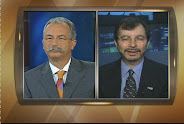The Fed's $7.77 Trillion Secret Funding Plan
As the ECB considers stepping up to the plate and acting as the lender of last resort, yesterday's blockbuster Bloomberg article on the US Fed's secret funding program (forced out in the open via a Bloomberg lawsuit) could not be more timely.
Here are a few excerpts:
"The Federal Reserve and the big banks fought for more than two years to keep details of the largest bailout in U.S. history a secret. Now, the rest of the world can see what it was missing.
The Fed didn’t tell anyone which banks were in trouble so deep they required a combined $1.2 trillion on Dec. 5, 2008, their single neediest day..."
"The amount of money the central bank parceled out was surprising even to Gary H. Stern, president of the Federal Reserve Bank of Minneapolis from 1985 to 2009, who says he “wasn’t aware of the magnitude.” It dwarfed the Treasury Department’s better-known $700 billion Troubled Asset Relief Program, or TARP. Add up guarantees and lending limits, and the Fed had committed $7.77 trillion as of March 2009 to rescuing the financial system, more than half the value of everything produced in the U.S. that year..."
"The secrecy extended even to members of President George W. Bush’s administration who managed TARP. Top aides to Paulson weren’t privy to Fed lending details during the creation of the program that provided crisis funding to more than 700 banks, say two former senior Treasury officials who requested anonymity because they weren’t authorized to speak..."
"TARP and the Fed lending programs went “hand in hand,” says Sherrill Shaffer, a banking professor at the University of Wyoming in Laramie and a former chief economist at the New York Fed. While the TARP money helped insulate the central bank from losses, the Fed’s willingness to supply seemingly unlimited financing to the banks assured they wouldn’t collapse, protecting the Treasury’s TARP investments, he says..."
"On Jan. 14, 2009, six days before the company’s central bank loans peaked, the New York Fed gave CEO Vikram Pandit a report declaring Citigroup’s financial strength to be “superficial,” bolstered largely by its $45 billion of Treasury funds..."
To read the full story, click here





























